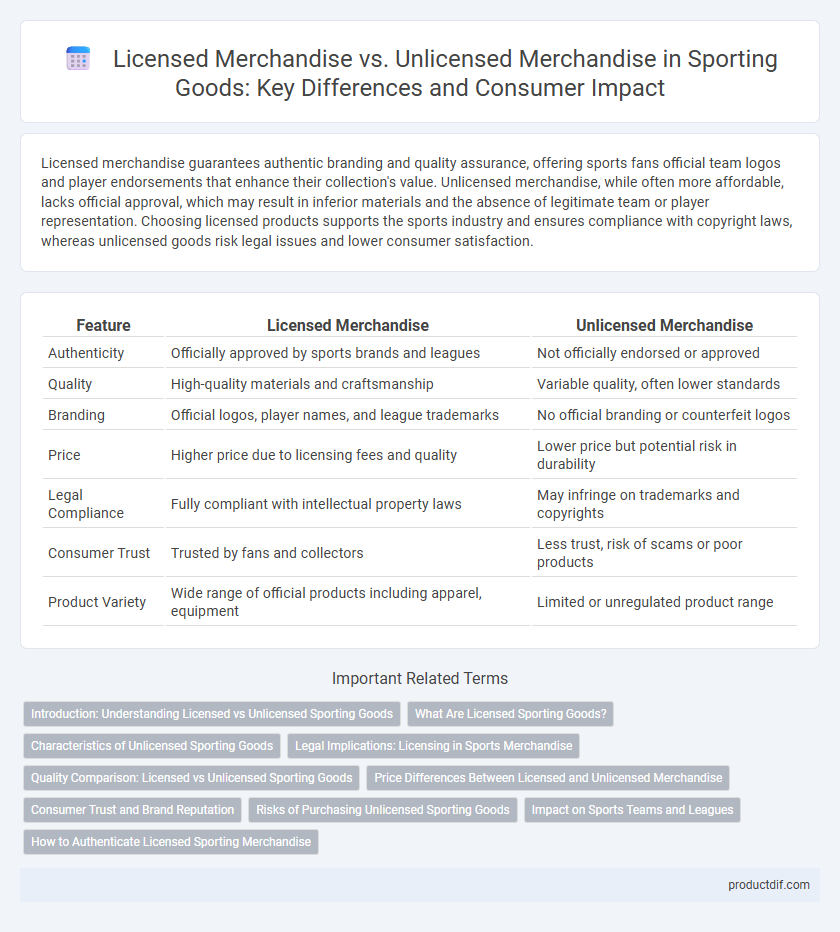Licensed merchandise guarantees authentic branding and quality assurance, offering sports fans official team logos and player endorsements that enhance their collection's value. Unlicensed merchandise, while often more affordable, lacks official approval, which may result in inferior materials and the absence of legitimate team or player representation. Choosing licensed products supports the sports industry and ensures compliance with copyright laws, whereas unlicensed goods risk legal issues and lower consumer satisfaction.
Table of Comparison
| Feature | Licensed Merchandise | Unlicensed Merchandise |
|---|---|---|
| Authenticity | Officially approved by sports brands and leagues | Not officially endorsed or approved |
| Quality | High-quality materials and craftsmanship | Variable quality, often lower standards |
| Branding | Official logos, player names, and league trademarks | No official branding or counterfeit logos |
| Price | Higher price due to licensing fees and quality | Lower price but potential risk in durability |
| Legal Compliance | Fully compliant with intellectual property laws | May infringe on trademarks and copyrights |
| Consumer Trust | Trusted by fans and collectors | Less trust, risk of scams or poor products |
| Product Variety | Wide range of official products including apparel, equipment | Limited or unregulated product range |
Introduction: Understanding Licensed vs Unlicensed Sporting Goods
Licensed sporting goods guarantee authenticity and quality by featuring official logos, team names, and player endorsements approved by sports leagues or governing bodies. Unlicensed merchandise lacks this official approval, often resulting in lower quality materials and potential legal issues related to copyright infringement. Consumers seeking genuine products and supporting their favorite teams should prioritize licensed goods for reliability and value.
What Are Licensed Sporting Goods?
Licensed sporting goods are products officially authorized by sports leagues, teams, or athletes, ensuring authenticity and quality. These items typically feature team logos, player names, and trademarks protected by intellectual property rights, differentiating them from unlicensed merchandise. Purchasing licensed sporting goods guarantees support for the official entities and offers fans genuine memorabilia with recognized value.
Characteristics of Unlicensed Sporting Goods
Unlicensed sporting goods often lack official team logos, branding, and endorsements, resulting in lower production quality and less authenticity. These products may use generic designs without adhering to league or manufacturer standards, which can affect durability and consumer trust. Unlicensed merchandise is typically sold at a lower price point but carries higher risks of poor craftsmanship and limited warranties.
Legal Implications: Licensing in Sports Merchandise
Licensed sports merchandise complies with intellectual property laws by obtaining official authorization from teams, leagues, or athletes, ensuring legal distribution and protection against counterfeit goods. Unlicensed merchandise infringes on trademarks and copyrights, exposing sellers and distributors to lawsuits, fines, and product seizures due to the unauthorized use of protected logos and branding. Proper licensing guarantees consumer trust and upholds brand integrity while supporting the athletes and organizations financially.
Quality Comparison: Licensed vs Unlicensed Sporting Goods
Licensed sporting goods guarantee superior quality due to strict manufacturing standards and official brand endorsements, ensuring durability and performance. Unlicensed merchandise often lacks rigorous quality control, leading to inconsistent materials and inferior craftsmanship. Consumers prioritizing longevity and authenticity typically prefer licensed products for reliable use in athletic activities.
Price Differences Between Licensed and Unlicensed Merchandise
Licensed merchandise in the sporting goods market typically commands higher prices due to official branding, quality assurance, and sponsorship fees associated with authentic products. Unlicensed merchandise offers more affordable alternatives but often lacks the durability, design accuracy, and official endorsements that justify the premium cost. Consumers weighing price differences must consider the value of authenticity and warranty protections when choosing between licensed and unlicensed sports gear.
Consumer Trust and Brand Reputation
Licensed merchandise enhances consumer trust by guaranteeing authenticity and quality, directly reinforcing brand reputation through official endorsements. Unlicensed merchandise risks damaging consumer confidence due to inconsistent product standards and potential copyright infringements, which can erode brand integrity. Maintaining a strong brand reputation relies heavily on the presence of licensed products that assure legitimacy and consumer protection.
Risks of Purchasing Unlicensed Sporting Goods
Unlicensed sporting goods often lack quality assurance and proper safety testing, increasing the risk of injury for users. These products may infringe on intellectual property rights, leading to potential legal issues for buyers and sellers. Purchasing unlicensed merchandise also undermines brand reputation and can result in poor durability and performance compared to licensed counterparts.
Impact on Sports Teams and Leagues
Licensed merchandise generates significant revenue streams for sports teams and leagues through official partnerships, ensuring quality control and brand consistency while enhancing fan loyalty. Unlicensed merchandise, often counterfeit, undermines these revenues, damages brand reputation, and leads to potential legal conflicts. Securing licensing rights supports sustainable economic growth and investment in team development and community programs.
How to Authenticate Licensed Sporting Merchandise
Authenticating licensed sporting merchandise involves examining official holograms, serial numbers, and authorized retailer tags that verify product legitimacy. Licensed merchandise typically includes certified logos, proper brand labels, and sturdier materials compared to unlicensed counterparts, which often display misspelled names or inferior craftsmanship. Verifying purchase through reputable sources and cross-checking against official league or team-approved databases ensures the authenticity of sporting goods.
Licensed merchandise vs Unlicensed merchandise Infographic

 productdif.com
productdif.com